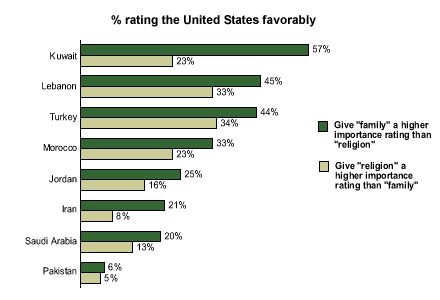A Gallup poll of eight predominantly Islamic countries* finds that the more religious people are, the lower their opinion of the United States. Put more positively, people who have other values that compete with the importance of religion tend to give the United States a more favorable rating than do people for whom religion is the highest value.
Religion and Family and Rating of the United States
Overall, residents who rate the importance of religion more highly than that of family are more likely to give a lower rating of the United States than are people who rate family more highly than religion. This general pattern applies in seven of the eight countries where this sentiment could be measured.
Kuwait, for example, has the lowest percentage of people who rated the importance of family more highly than that of religion (16%), among the eight countries in which this question was asked. But that segment of the population is much more favorable toward the United States than are the people in Kuwait who rated religion more highly.
As shown in the table below, only 28% of all Kuwaiti residents give the United States a favorable rating, while 41% give an unfavorable rating. However, among that segment of the population in Kuwait who rate the importance of family more highly than that of religion, 57% give the United States a favorable rating, while just 24% give an unfavorable rating. Among those who choose religion, just 23% give the United States a favorable rating and 44% an unfavorable rating.
|
Comparison of Rating of the United States With Choosing Religion Over Family (in Kuwait) |
|||
|
Rating of the United States |
All Residents in Kuwait |
Which Is More Important? |
|
|
Family |
Religion |
||
|
% |
% |
% |
|
|
Favorable |
28 |
57 |
23 |
|
Neutral |
31 |
19 |
33 |
|
Unfavorable |
41 |
24 |
44 |
|
TOTAL |
100 |
100 |
100 |
|
Percentage of Residents |
100 |
16 |
84 |
In addition to Kuwait, the correlation between religion and a lower rating of the United States is found in Lebanon, Saudi Arabia, Jordan, Turkey, Iran and Morocco. In Pakistan, ratings of the United States are just as low among those who choose family (6% favorable to 72% unfavorable) as they are among those who choose religion (5% favorable to 71% unfavorable).

Importance of a Spiritual Life and Rating of the United States
A separate question asked respondents to indicate how important having an enriched religious/spiritual life is to them: 1) essential (they could not live without it), 2) very important, or 3) useful (but could live without it). Few people chose the latter category, so the major distinction was between the first two categories.
The results show that people who say that it is essential for them to have an enriched spiritual life tend to give lower ratings to the United States than those who say religion is either very important or just useful. The differences here, however, are not as dramatic as when the importance of religion is compared with the importance of family.
Three countries show large differences in ratings of the United States between those who rate religion as essential and those who do not. In Jordan, the favorable rating is only 19% among the more religious, and 36% among the rest -- for a difference of 17 percentage points. Morocco reveals a similar pattern, with a difference of 16 percentage points. In Iran, the difference is slightly lower, 13 points, with only 5% of the most religious giving the United States a positive rating, compared with 18% among the rest.
